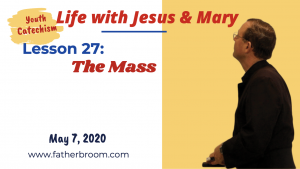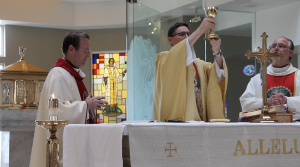
Lesson 27: The Mass
1. How does the Mass relate to life of the Church?
The Mass is “the summit toward which the activity of the Church is directed; it is also the source from which all her power flows.” (Vatican II, Sacrosanctum Concilium #10)
Blessed Mother Theresa of Calcutta (1910- 1997)
Mother Theresa of Calcutta considered the Mass and her devotion to Jesus in the Eucharist as the most important part of her day. She founded a congregation of sisters called the Missionary Sisters of Charity. They are present all around the world, especially in those places where there is the greatest poverty – “the poorest of the poor” She often said that in the Mass and especially in the Eucharist she found Jesus who strengthened her. Jesus in the Eucharist strengthened her and nourished her, so that she could go out and help the poor. In the poor she discovered the presence of Jesus, remembering Our Lord’s words: “whatever you do unto the least of my brothers that you do unto Me.” (Matthew 25:40) The Mass was thus the source from which all her power flowed. All of her actions she would then bring back to the Mass, and she would offer them and herself along with Jesus to God the Father in love and worship. The Mass was thus also the summit toward which all of her activity was directed.
2. What are we called to do at Mass?
We are called to have a “full (interior and exterior), conscious, and active participation” in the Mass. We are called to:
-Unite our voices in prayer and song to the rest of the assembly – like Mary;
-Listen to the Word of God attentively and reflect on it – like Mary;
-Pray in the Silence of our hearts – like Mary;
-Offer our lives along with Jesus in the Eucharist ot he Father – like Mary does – in adoration; thanksgiving; reparation for sin; and for the needs of all people, both the living and those in purgatory; and
– Receive the Eucharist with deep faith and love – like the Virgin Mary.
3. How do we prepare for Mass?
We prepare for Mass by prayer, especially to Mary, and by living a life that is pleasing to God.
It is very helpful to read the readings before Mass in the presence of Mary.
It is very helpful to say the rosary right before or after Mass.
It is good to make an examination of conscience, and a sincere act of contrition. It is very important to go to frequent Confession.
It is very important to spend time adoring Jesus in the Blessed Sacrament.
It is very important that we spend some time in prayer before and after Mass.
4. What are the two major parts of the Mass?
The two major parts of the Mass are:
- The Liturgy of the Word; and
- The Liturgy of the Eucharist
“The two parts which in a sense go to make up the Mass -n the liturgy of the word and the eucharistic liturgy – are so closely connected with each other that they form but one single act of worship.” (Vatican II, Scrosanctum Concilium, #56) In committing ourselves to live God’s word, we are already starting to offer ourselves – something that we will do even more profoundly during the liturgy of the Eucharist.
5. What happens during the liturgy of the Word?
During the Liturgy of the Word the Bible is read. God is speaking to us with great love through the reading of the Bible. We should listen carefully.
Someone who is not a priest normally reads the first and second readings. We listen carefully because God is peaking to us with much love.
6. What is the most important part of the liturgy of the Word?
The most important part of the Liturgy of the Word is the Gospel.
There are four Gospels in the Bible: Matthew, Mark, Luke nd John.
The Gospels tell us about the life of Jesus.
The Gospels give us the words of Jesus.
During the Gospel Jesus is speaking to us with much love.
During the Gospel we all stand so that we can listen carefully. Mary helps us to listen with faith and love.
7. What is the liturgy of the Eucharist?
The Liturgy of the Eucharis is the Sacrifice of the Cross, make present upon our altars.
-Just like on the Cross, the Priest is Jesus. Jesus becomes present, under the appearance of bread and wine.
-Just like on the Cross, the Victim offered is Jesus. Jesus becomes present, under the appearance of bread and wine.
– Just like on the Cross God is worshiped, thanked and loved through the offering of Jesus. Through the offering of Jesus, we ask God to have mercy on the world and to help us.
-Just like on the Cross, Mary is spiritually present during the Mass. At every Mass Jesus gives Mary to us as our mother. Mary helps us to offer ourselves along with Jesus to the Father.
-The only difference between the Cross and the Mass is that Jesus does not die during the Mass. He now lives forever.
8. What is the preparation of the gifts?
At the preparation of the gifts bread and wine are brought to the priest. They are offered to God. We also begin to offer ourselves to God. We want to please God by loving Him. Just as the bread and wine will become Jesus, so the more we offer ourselves the more we will become like Jesus. Mary helps us to do this. We offer ourselves through her.
9. What is the most important part of the liturgy of the Eucharist?
The most important part of the liturgy of the Eucharist is the moment of the consecration. At that moment the bread and wine become the Body, Blood, Soul, and Divinity of Jesus Christ.
Only a ministerial priest, who has received Holy Orders, can change bread and wine into Jesus. He is acting “in the Person of Christ.”
10. What are we supposed to do right after the bread and wine become Jesus?
At the moment of the consecration we should say, “My Lord and my God, I love You.” We should try to have the sentiments of Mary.
We should then offer Jesus with his love to God and the Father along with our hearts and our love – we do this through Mary. This is the most important action of our “common priesthood,” that we received at baptism.
11. Why do we lovingly offer Jesus along with ourselves to God the Father?
We lovingly offer Jesus along with ourselves to God the Father:
- To love God the Father
- To adore God the Father
- To thank and praise God the Father;
- To ask God the Father to have mercy on us, on the souls in purgatory, and on the whole world; and
- To ask God the Father to help us and the whole world in all our needs.
We are able to do this because of our “common priesthood” that we received at baptism.
12. What should we do to receive Jesus well?
Before receiving Jesus, we should ask Mary to make our souls beautiful for Jesus: “Mary, make my soul a heaven for Jesus.”
We should try to receive Jesus the way Mary did.
When we receive Jesus in Holy Communion we should:
- Love Him
- Thank Him
- Offer Him our lives, and ask Him to take over completely – through Mary, so that our offering will be completely without stain.
- Pray for our family, your friends, and the whole world.
- Ask Him to make us saints.

13. What is the greatest act of love in the world?
The Mass is greatest act of love in the world.
During the Liturgy of the Eucharist Our Lord says to His Father, “I love you.”
He tells this to the Father for us.
He wants us to say it with Him.
At Holy Communion HE tells us “I love you.”
At the same time, we tell Jesus that we love Him.
St Isidore (died in 1130)
St Isidore was a hard-working farmer in Spain. HE worked for a wealthy man. He did his work very well, helped the poor, and spent a lot of time in prayer. Not only did he never miss Mass on Sunday, but also, he went to Mass every day. Some other workers, who were jealous of him, told his boss that he was neglecting his work in order to go to Mass. The employer came to look and found two angels helping Isidore while he was tilling the soil. They were sent by God to help Isidore in return for his attending Mass so faithfully. As a result of having gone to daily Mass Isidore got more work done than anyone else.